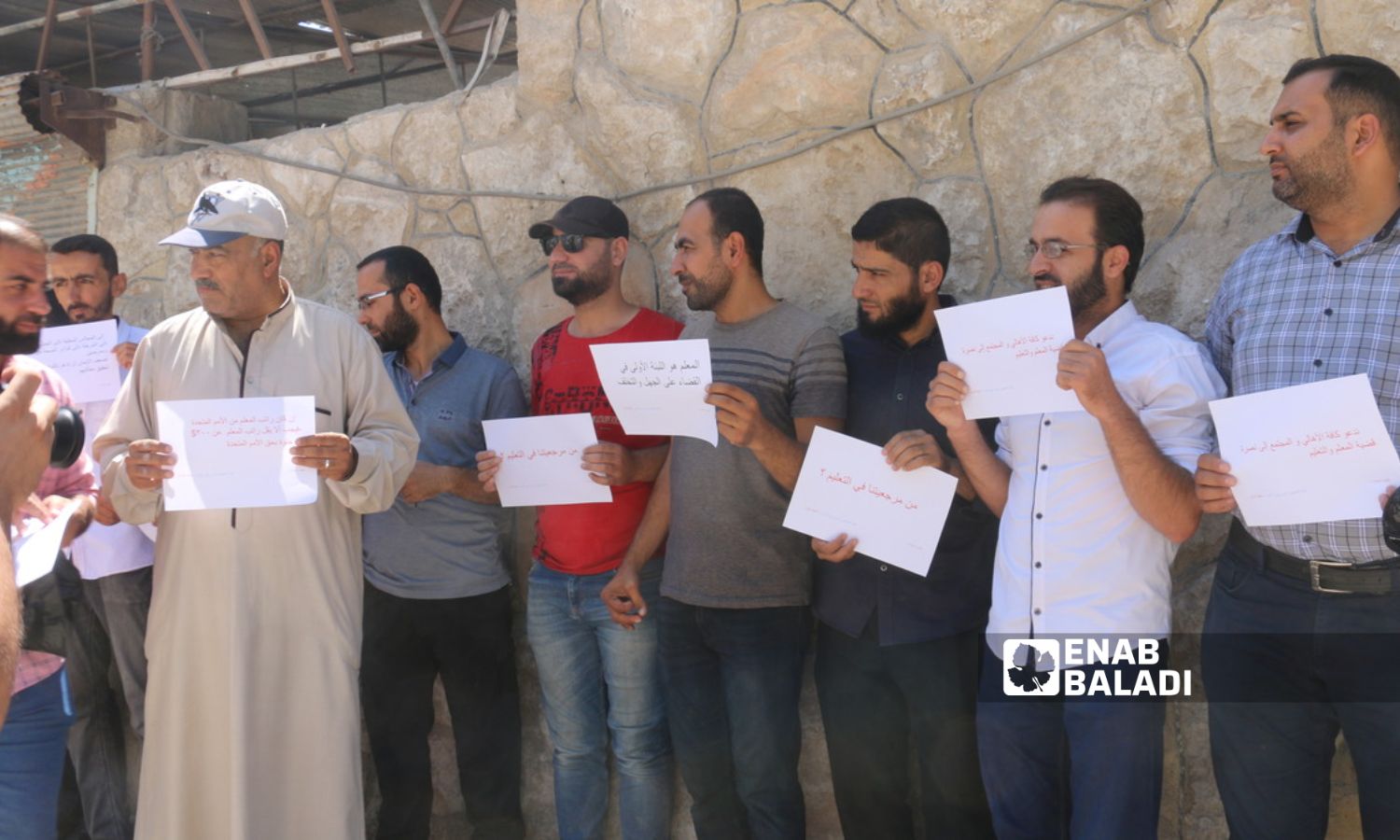



Azaz – Dayan Junpaz
With the start of the school year, the pace of protests by educational sector workers increased in the villages and towns of the northern and eastern Aleppo countryside, areas under the control of the Turkish-backed Syrian Interim Government (SIG).
The first factor of these protests is the decline in the value of monthly wages, which no longer cover part of the family’s needs, in light of the significant rise in commodity prices and the instability of the Turkish lira against the dollar.
A single teacher receives 1,750 Turkish liras (about $65), and a married teacher 1,925 TL (about $72) in an area where the recognized poverty limit has reached 5,486 TL, and the extreme poverty limit has reached 3,957 TL, according to the local relief group the Syrian Response Coordination Group (SRCG).
Dozens of teachers in cities, towns, and camps in rural Aleppo organized protests on August 17 and 22 in front of education directorates to demand improving the living conditions, reforming the educational process, and developing radical solutions to recurring educational problems every year.
Mohammad Sabah Hamidi, head of the teachers’ union in Azaz, told Enab Baladi that teachers’ tension is severe and the protests are the beginning of a series of sit-ins.
He stated that the demands to improve the lives of workers in the educational sector and the reality of education have been repeated for years without those concerned responding to this matter.
The authorities concerned with the educational file are also absent, and there is no ear for teachers’ demands, which is a factor that constantly makes the matter worse.
The union official added that the Turkish government is primarily responsible for the poor educational record inside Syria and that it has many partners and is able to support the educational process either through it or through organizations operating in the region.
Hamidi explained that teachers and activists called on the Turkish side several times to involve organizations or the United Nations to help improve the educational situation in northern Syria, but the Turkish authorities refused under the pretext of harming Turkish national security, according to him.

Teachers protest against their low wages and demand improvement in the educational situation in the border city of Azaz in the northern countryside of Aleppo – August 22, 2023 (Enab Baladi/Dayan Junpaz)
Mohammad Mousa, a teacher at al-Shu’la School in the town of Shamarin, near Azaz, told Enab Baladi that the monthly salary is very low, and teachers’ rights are lost.
Mousa mentioned that teachers are required to increase the number of working hours, in addition to having a “condescending attitude when dealing with them” when they direct a question or request to the local administrators in education or the local council, and the local authorities always attribute the reason to the Turkish side.
The teacher explained that if the demands are not met, the only option for teachers is to resign en masse and work in any other field, according to him.
According to what Enab Baladi monitored in the teachers’ protests, talk about leaving the education sector was repeated by the demonstrators if job opportunities were available, on the grounds that any other stable job gives the person a higher salary.
For his part, Ahmed Khater, a teacher in the al-Nour camp school in the vicinity of Azaz, told Enab Baladi that the lack of appreciation for the work of teachers in the northern Aleppo countryside portends a disaster within the educational sector.
He added that the matter forces thousands of teachers not to attend school this year, which means that there are thousands of students on the verge of dropping out of school.
Khater stated that the education problem is not limited only to teachers’ salaries, although it is the most important issue, but has extended to include student issues and the lack of support for public schools.
The basic supplies in schools have become insufficient for students due to the lack of copies of books, the collapse of the infrastructure, and the inability to secure daily fuel in the winter, the teacher added.
Munther al-Mohammad, a teacher in the town of Shamarin, told Enab Baladi that the decline in the value of the Turkish lira against the dollar and the rise in prices made the teacher’s living situation very bad.
Al-Mohammad, who resides in one of the camps located near the Syrian-Turkish border, added that the teacher’s falling into destitution and poverty pushes him to search for other jobs after finishing his daily shift at school.
Teachers are exposed to many daily pressures and challenges in order to earn their livelihood, which forces them to work, if the opportunity is available outside working hours, in any profession that may be in construction, portering, or agriculture, for low wages that may not exceed two dollars a day, according to what Enab Baladi monitored.
Teachers’ demands have been repeated for years at the beginning of each semester, while they do not accept any partial or temporary solutions, such as food baskets or clothing vouchers, as some teachers consider that these do not meet their demands.
The northwestern region of Syria is suffering from a deterioration in economic conditions, which has had a negative impact on all aspects of life.
The most recent increase in teachers’ salaries in areas controlled by the Interim Government was in December 2022 and amounted to 75%, but that did not stop the protests and demands.
if you think the article contain wrong information or you have additional details Send Correction